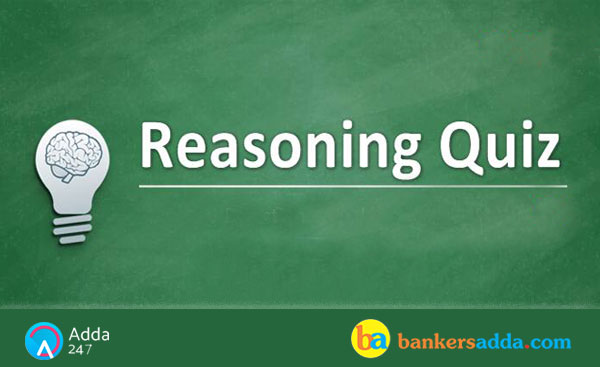Dear Aspirants,

Reasoning Ability is an onerous section. With the increasing complexity of questions, it becomes hard for one to give it the cold shoulder. The only way to make the grade in this particular section in the forthcoming banking exams like IBPS RRB is to practice continuously with all your heart and soul. And, to let you practice with the best of the latest pattern questions, here is the Adda247 Reasoning Quiz based on the study plan and the exact same pattern of questions that are being asked in the exams.
Directions (1-5): Read the following information carefully and answer the question:
There are 8 people A, B, C, D, E, F, G and H sitting in a row and four people are facing north and four are facing south direction but not necessary in the same order. No two persons who sit together face the same direction. E sits third to the right of D. Only one person sits between E and F. B sits fourth to the left of C. A and F faces same direction. Either D or E sits at the extreme end of the row. F faces in north direction. A and G do not sit at any extreme end. Not more than one person sit between H and F.
Q1. Who sits 2nd to the right of the one who sits immediate right of C?
(a) B
(b) H
(c) G
(d) F
(e) None of these
Q2. Who among the following sits immediate left of F?
(a) A
(b) C
(c) H
(d) B
(e) None of these
Q3. How many persons are sitting to the left of F?
(a) One
(b) Two
(c) Three
(d) Four
(e) None of these
Q4. Who sits exactly between B and D?
(a) A
(b) C
(c) E
(d) F
(e) None of these
Q5. Which of the following pair sits at extreme ends of the row?
(a) F, B
(b) H, C
(c) H, D
(d) E, B
(e) None of these
Directions (6-10): In the following questions the symbols >, <, ≥, ≤, = are used with the following meanings. These statements are followed by two conclusions:
Give answer as:
(a) if only conclusion I follows.
(b) if only conclusion II follows.
(c) if either conclusion I or II follows.
(d) if neither conclusion I nor II follows.
(e) if both conclusions I and II follow.
‘A > B‘ means ‘A is neither smaller nor greater than B‘
‘A < B’ means ‘A is neither smaller than nor equal to B‘
‘A ≥ B‘ means ‘A is not greater than B‘
‘A ≤ B‘ means ‘A is not smaller B‘
‘A = B‘ means ‘A is neither greater than nor equal to B‘
Q6. Statements: R ≥ S =T > U < X
Conclusions: I. S < X II. T > R
Q7. Statements: D = L < G ≥ E ≥ F
Conclusions: I. F ≥ L II. G < D
Q8. Statements: A > B ≥ F< C = D
Conclusions: I. C < A II. F< D
Q9. Statements: K > L ≥ M = N < P > O
Conclusions: I. K < P II. P > K
Q10. Statements: M ≤ S > B ≥ L = U ≥ T ≥ D
Conclusions: I. B ≥ D II. S > L
Directions (11-15): In each of the questions given below, a group of letters is given followed by some combinations of number and symbols. You have to find out which of given combinations correctly represents the group of letters based on the numbers/symbols codes and the conditions given below. If none of the given combinations represents the group of digits correctly, give (e) i.e. ‘None of these’ as the answer.
Condition for coding the group digits:
(i) If the first letter is vowel and last letter is consonant, then the codes for the first and the last letter are to be interchanged.
(ii) If the first as well as the last letter is vowel, then both are to be coded by the code for the last letter.
(iii)If the first as well as the last letter is consonant, then both are to be coded by the code for the first letter.
Q11. ECEHJKI
(a) 98$8&&9
(b) 98$533&
(c) 98$53&9
(d) $8$83&3
(e) None of these
Q12. IDFKCF
(a) 9@2&82
(b) 2#2&89
(c) 2#&289
(d) 2#2&$9
(e) None of these
Q13. JCAEFJC
(a) 881$238
(b) 818$23@
(c) 8@1$23@
(d) 881$32@
(e) None of these
Q14. BDAFGHE
(a) @#21*5$
(b) @#12*8$
(c) @#12*$5
(d) @#12*5$
(e) None of these
Q15. IADJC
(a) 81#3&
(b) 81#39
(c) 813#9
(d) 18#39
(e) None of these
You may also like to read:





 The Hindu Review October 2022: Download ...
The Hindu Review October 2022: Download ...
 RBI JE Recruitment 2025 Notification Out...
RBI JE Recruitment 2025 Notification Out...
 JK Bank Apprentice Recruitment 2024 Noti...
JK Bank Apprentice Recruitment 2024 Noti...




